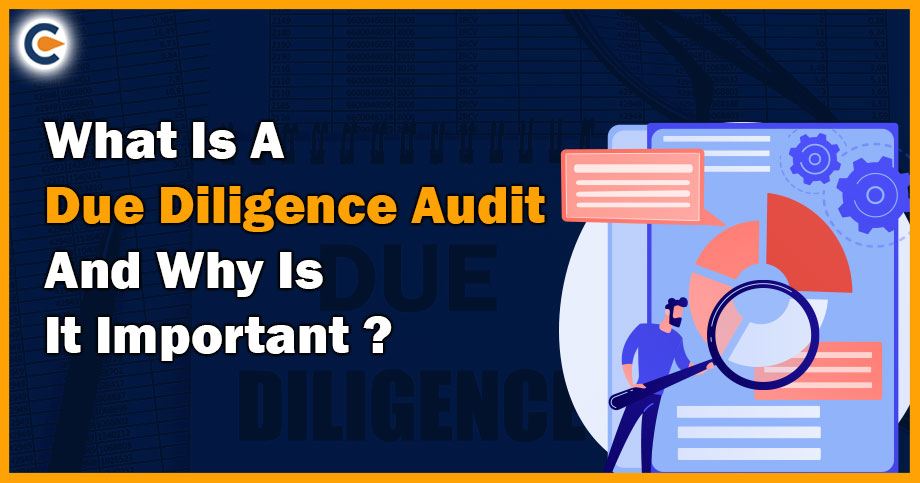Financial Due Diligence focuses on establishing a factual and historical foundation of Company. Financial Due Diligence not only reviews the historical foundation of the Company but also gives an expert and financial opinion about the future of the Company. Any person while investing or selling or buying or as routine check-in affairs of Company conduct Due Diligence process in the Company. Any person doing business always wants to be sure about the future profitability of the business in the market, so this Due Diligence process is conducted in the Companies. In the article, we will discuss the objectives, importance, methods, and benefits of Financial Due Diligence.
What is Financial Due Diligence?
Financial Due Diligence is a process which involves an investigative analysis of the business of Target Company, and also assessing the critical financial issues facing the cash flows and business of the Target Company. Due Diligence is usually performed when any person wants to acquire a Company. The acquirer, in this case, needs some certainty regarding the financial status of the Company. The process of Due Diligence is conducted into the Company to look into the key issues facing the Company’s financial business. Furthermore, to identify the key financial risks and potential deal breakers of the financial transactions of the Company.
Due Diligence is not only conducted when there is buying or selling or investing in Company. The owner of the Company sometimes sits and investigate the financial books of the Company as a routine check of the financial status of the Company.
It is essential to do a financial analysis of the Target Company. The acquirer needs to be always ensured and understand what risks are existing in the Company. The purchase of assets means that the historical financial and legal responsibility of Target Company is not transferred to the acquirer. Hence, it can be said that the Due Diligence is process is less extensive and much shorter than the other transactions like when any Company acquires shares. However, it is not valid in all circumstances and cases. The acquirer should always be sure about the future earning of the Target Company. So to deal with it, the acquirer should always determine the value drovers of the future earnings of Target Company and should always be assured that the gains will always be sustainable in the future.
What are the Objectives of Financial Due Diligence?
The process of Financial Due Diligence is much more than a simple checklist of the procedures of the Company. The main objectives are as follows:
- To Check and reveal any financial risks related to the Company;
- To understand the historical financial situation of the Company;
- To check the correctness of the numbers of the Company;
- To understand the Target Company’s balance sheet;
- To understand Target Company’s profit and loss;
- To go for further price negotiations and opinions on the purchase price;
- To forecast the Target Company’s future financial situation;
- To formulate post-takeover acquisition plans and integration program;
- To calculate the financial risks and avoid such financial risks of Target Company.
What are the Fundamental Principles of Financial Due Diligence?
The process of conducting Financial Due Diligence is different from the general audit work of the Company. Hence, still, the persons participating in the Due Diligence process must adhere to the following fundamental principles:


Principle of Independence
Under this principle, the financial consultancies and the financial professionals conducting the process of Financial Due Diligence are the two elements that are covered. The Financial consultancies and the financial professionals conducting the process of Due Diligence should not be in any means connected with the Target Company. There should be not any direct or indirect economic interests of the financial consultancies, and financial professionals should be involved with the concerning Target Company.
Principle of Prudence
The financial consultancies and the financial professionals conducting the process of Due Diligence in the target Company should hold a prudent and professional approach throughout the time the process is being conducted in the Target Company. A proper review of the work plans, working papers, staff allocation, and report of Due Diligence should be done by the financial consultancies and financial professionals involved in the process of Due Diligence.
Principle of Comprehensiveness
The Principle of Comprehensiveness the review of all sides and aspects of all items and areas related to Financial Statements should be done by the financial consultancies and financial professionals conducting the process of Due Diligence in the Target Company. A check, especially on the hidden liabilities of the Target Company, should be done by the financial consultancies and financial professionals.
To conduct a proper Due Diligence process in Target Company and to provide benefit to acquirer proper planning, strategy, technique, and procedures should be followed as per relevant professional standards to achieve the goal set by financial consultancies and financial professionals at the time of engagement in the process of Due Diligence.
Principle of Materiality
The financial professionals and the financial consultancies conducting the Due Diligence process in Target Company use some level of risks while performing the financial review of the Target Company. The levels of risks involved should be an analyst at the risk assessment stage. The materiality principle set some materiality performance for the financial consultancies and financial professionals and some sort of tolerable errors which the consultancies and professionals can accept later on. The word done by the financial consultancies and financial professionals should be able to sufficiently and appropriately obtain evidence to prove their report to the acquirer. The report of this process of Due Diligence should possess the characteristic of verifiability.
Read our article:Due Diligence: A Complete Run-Through
>What are the Methods of conducting Financial Due Diligence?
There are a variety of methods to perform Financial Due Diligence in Target Company. Financial consultancies and financial professionals apply the following methods:


Review of Target Company
The financial consultancies and the financial professionals do a thorough review of the financial statements and other financial materials of the Target Company. Then the critical and material financial factors of the Target Company are identified.
The review should be conducted either internally, by the accounting and finance department of the acquirer or can be done externally by the financial consultancies or financial professionals who conduct Due Diligence process in different Companies. The main benefit of using external financial consultancies and financial professionals is that the review given by them is an independent viewpoint with no direct or indirect interest from the outcome of the process.
Conducting Analytical Procedures
The financial consultancies and financial professionals conduct some analytical procedures such as analysis of performance, trend analysis, structural analysis of the Target Company. The materials acquired through all the channels of analysis are collected, and results are collated to discover the critical issues and abnormalities related to the Target Company.
Interview in Target Company
The primary method used for conducting Due Diligence is the interview in Target Company. There should be sufficient communication between the financial consultancies and financial professionals conducting Due Diligence process with the internal hierarchy of Target Company, employees at different positions of Target Company and intermediary institutions related to the Target Company.
Internal Communication
The financial consultancies and financial professionals usually come from different backgrounds and specializations; hence, this makes mutual communication an essential element of the process of Due Diligence. The work results should also be shared timely for the more efficient accomplishment of the investigative targets is an effective method for conducting the Due Diligence process in a Company.
What Documents are required for Financial Due Diligence?
The documents required for Financial Due Diligence are as follows:
- Copy of minutes of Board Meetings, General Meetings, and any other Meetings;
- Copy of notices of all meetings held in the Company;
- Copy of attendance sheet of all Meetings in the Company;
- Copy of Statutory Registers maintained by Company under the Companies Act, 2013[1];
- All the Filings made with the Registrar of Companies (ROC);
- A copy of the declaration of the Director’s interest in the Company;
- Copy of all consent forms of shareholders for convening a Board or General Meeting;
- A list of all the cities and countries where the Company has business operations;
- Details of all the debentures or other securities the Company issued till date along with the debenture bonds or other documents related to the issue;
- All agreements containing veto rights, voting rights, right of first refusal, pre-emptive rights or other preferential rights to acquire securities;
- Agreement of rights to appoint nominee Director in Company;
- Agreement of any change in the foundation team of the Company along with all the filings made related to such change;
- The GST Registration of the Company;
- The table showing the issued, authorized and paid-up capital of the Company;
- The copy of sample share certificates, other securities, and options issued by the Company;
- Copy of any share transfer forms if executed by the Company;
- Any documentation or agreements relating to exchange, conversion, redemptions, repurchases, or similar transactions involving the securities of the Company.
What is the need to conduct Financial Due Diligence?
The Financial Due Diligence in Company is required so that the acquirer is well aware of the essential considerations of the Target Company like:
- Ownership and Management of Target Company
There should be research is done on the ownership of Company, like, who runs the Company, or if the founders still run Company?
- Balance Sheet Analysis of Target Company
The analysis of the debt-equity ratio of the Company should be done of the Target Company by the acquirer. The debt of the Target Company should also be checked. The target Company should never be in too much debt as it will affect the future financial business of Target Company.
- Capitalization of Target Company
The comparative analysis of both how vast and volatile is the market and Target Company.
- Profit and Revenue Trends of Target Company
The rise, fall, and stability of any of the trends of Target Company are looked upon to avoid any loss in the future.
- Risks related to Target Company
The Risks specific to Companies and large industries are overviewed of Target Company. A check on the outstanding risks associated with Target Company is also done. The prediction related to some unforeseeable risks is made to avoid future losses in the business of the Target Company.
- Expectations from Target Company
The acquire always expects a reasonable estimate of profits and financial gains from the Target Company. Hence the estimates are calculated beforehand by an acquirer to be sure about any investment made in the future in Target Company.
- Stocks and Possibilities related to Target Company
The acquiree should check for how long period the Target Company had been trading in the market. The term of trading is whether short or long should also be reviewed by the acquirer. The Target Company, whether had any steady stock price or the stock prices were always fluctuating, should be reviewed by the acquirer.
Conclusion
A vast majority of the modern companies are managed and operated by professional persons, and these professional persons hold a responsibility to clarify and demonstrate the shareholders the necessity and feasibility of any change in the Company. The process of Financial Due Diligence provides the platform to the professional persons of the Target Company to explain the need for change in the Company. On the other hand, the Financial Due Diligence is a process to provide a reasonable overview of the working of the Target Company to the acquirer as well. Hence, this process is a necessary and indispensable tool for the acquirer to overlook the risks and issues involved with the Target Company. So, the acquirer conducts the process of Due Diligence in the Company. The process of Financial Due Diligence is long-lasting, lengthy, and time-consuming. We at Corpbiz have experts to help you in the process of Due Diligence. Our experts will help you and assist you in the process of Due Diligence. The experts will ensure the successful and timely completion of your work.
Read our article: Legal Due Diligence: A Complete Checklist











